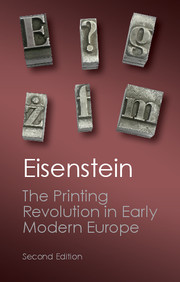Book contents
- Frontmatter
- Contents
- List of Illustrations and Maps
- Preface to the Second Edition
- Introduction
- THE PRINTING REVOLUTION IN EARLY MODERN EUROPE
- PART I THE EMERGENCE OF PRINT CULTURE IN THE WEST
- 1 An Unacknowledged Revolution
- 2 Defining the Initial Shift
- 3 Some Features of Print Culture
- 4 The Expanding Republic of Letters
- PART II INTERACTION WITH OTHER DEVELOPMENTS
- Afterword: Revisiting the Printing Revolution
- Selected Reading
- Index
2 - Defining the Initial Shift
from PART I - THE EMERGENCE OF PRINT CULTURE IN THE WEST
Published online by Cambridge University Press: 05 October 2013
- Frontmatter
- Contents
- List of Illustrations and Maps
- Preface to the Second Edition
- Introduction
- THE PRINTING REVOLUTION IN EARLY MODERN EUROPE
- PART I THE EMERGENCE OF PRINT CULTURE IN THE WEST
- 1 An Unacknowledged Revolution
- 2 Defining the Initial Shift
- 3 Some Features of Print Culture
- 4 The Expanding Republic of Letters
- PART II INTERACTION WITH OTHER DEVELOPMENTS
- Afterword: Revisiting the Printing Revolution
- Selected Reading
- Index
Summary
We should note the force, effect, and consequences of inventions which are nowhere more conspicuous than in those three which were unknown to the ancients, namely, printing, gunpowder, and the compass. For these three have changed the appearance and state of the whole world.
Francis Bacon, Novum organum, Aphorism 129To dwell on why Bacon's advice ought to be followed by others is probably less helpful than trying to follow it oneself. This task clearly outstrips the competence of any single individual. It calls for the pooling of many talents and the writing of many books. Collaboration is difficult to obtain as long as the relevance of the topic to different fields of study remains obscure. Before aid can be enlisted, it seems necessary to develop some tentative hypotheses relating the shift from script to print to significant historical developments.
This task, in turn, seems to call for a somewhat unconventional point of departure and for a reformulation of Bacon's advice. Instead of trying to deal with “the force, effect, and consequences” of a single postclassical invention that is coupled with others, I will be concerned with a major transformation that constituted a large cluster of changes in itself. Indecision about what is meant by the advent of printing has, I think, helped to muffle concern about its possible consequences and made them more difficult to track down. It is difficult to find what happened in a particular Mainz workshop in the 1450s.
- Type
- Chapter
- Information
- The Printing Revolution in Early Modern Europe , pp. 13 - 45Publisher: Cambridge University PressPrint publication year: 2012

